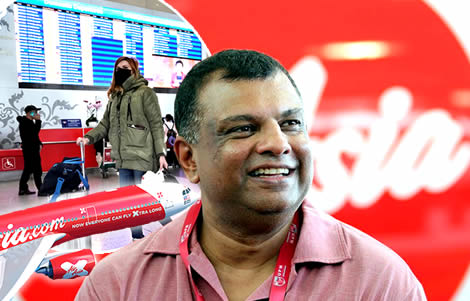Key consideration now according to Tony Fernandes is the momentum of growing numbers which generates income for the economy including taxes for the government. Mr Fernandes felt that the fee, at this time, may hinder efforts to attract more visitors and to establish more flight links with Thailand.
A top airline executive is urging the Thai government to put off further the proposed Thailand Tourism Fee (TTF) which was postponed from August to later in the year. The levy which is to be collected by airlines flying into Thailand from passengers was put on hold after a top Tourism Ministry official said it was not clear yet how it would apply to visitors arriving by sea and by land. The levy was recommended by a special panel in 2019 to provide extra resources for tourism infrastructure and to introduce automatic health and medical insurance for holidaymakers in the case of an emergency in the kingdom.

A top Thai airline executive has called on the government not to go ahead with the proposed ฿300 tourism levy in the short term as the kingdom’s foreign tourism industry is beginning to gain momentum and could be sensitive to any changes at this time.
Thailand is understood to have welcomed 4.3 million visitors in the opening eight months of the year although the kingdom still posted a substantial $4.1 billion current account deficit for July 2022 as its economy, like others in the world, labours under elevated energy costs and reduced export growth as national economies reel from the disruptions caused by the war in Ukraine, higher interest rates and reduced demand.
Levy in the pipeline since 2019 and comes with a key benefit: automatic medical insurance for visitors
The new levy known as the Thailand Tourism Fee (TTF), has been in the pipeline, in its current format, since 2019 and follows earlier attempts to introduce such a fee over previous decades.
The tourism fee was supposed to come into effect in August but the Ministry of Tourism and Sports, weeks before, announced that it was being postponed until later in the year.
Mongkon Wimonrat, the permanent secretary at the ministry, cited administrative concerns in July for the ongoing hiatus over the introduction of the measure.
There have also been reports that many of the airlines flying into Thailand, although by law, legally obliged to collect the fee, are not happy with the anticipated extra administrative work required to collect it from each passenger flying to Thailand.
Plan broadly welcomed because of the insurance benefit but is resisted by airlines who are tasked with its collection from inbound passengers to Thailand
The Thailand Tourism Fee (TTF) itself has been recommended by industry experts because it will introduce automatic medical insurance coverage for all visitors while in the kingdom, a facet of the moderate fee that has been widely welcomed although it is thought only ฿34 of it will be spent on this provision.
Funding for tourism development and critically, full medical coverage for visitors to the kingdom
The medical insurance coverage provided is limited to ฿500,000 or $13,661 and does not cover an emergency evacuation of injured foreigners from Thailand, a key criticism of industry observers.
This week, Mr Tony Fernandes, the acting Chief Executive Officer of Air Asia X, the long haul arm of the popular budget carrier that is currently undergoing a rehabilitation process through the Central Bankruptcy Court in Bangkok, said his airline stands ready to implement the new tax as it is legally bound to do under flight regulations.
Airline executive feels the tax right now could be counterproductive to the country’s interests
However, he urged the government to hold off at this time so as not to impede the gradual recovery of foreign tourist numbers which is vital to the economy.
Mr Fernandes acknowledged that the fee itself at $8 or $9 was relatively insignificant to holidaymakers but suggested that the potential negative consequences from introducing the charge on short-term numbers may be counterproductive for the Thai economy which is so dependent on foreign tourism to thrive, particularly this year.
Thailand’s foreign tourism industry accounts directly for 12% of GDP but some analysts estimate that up to 25% of the country’s real economy is linked to the flow of foreign nationals and the money they bring into the kingdom.
Operational impact of the charge on this year’s tourism drive would far outweigh any funding gain
He said that the negative economic impact of the levy would far outweigh the benefits of any funding it generates for the government given the taxes and income derived from foreign tourist spending.
Tourist levy hits further turbulence with fears it could harm airline’s effort to boost flight numbers
Thailand’s once mighty foreign tourism industry lastingly damaged with lower spends and numbers
More foreign tourists arriving from Asian countries dominate the mix with less than 10% of visitors from the US and UK in the first seven months of 2022
This year there is mounting concern for the long-term future of the foreign tourism industry as the amount of money the average incoming tourist is spending is 12% less than in 2019 with more visitors from within Southeast Asia and fewer long-haul travellers to Bangkok and Phuket international airports.
Thailand needs more inbound flights
This has been a problem acknowledged by Tourism Authority of Thailand (TAT) Director-general Yuthasak Supasorn who in recent months has estimated that the kingdom only has 30% to 33% of the flight capacity seen in 2019 while pointing out that 50% was essential if Thailand is to achieve even its short term objectives as the kingdom targets 10 million visitors for 2022.
Mr Fernandes attributed the slow rebound in Thailand’s foreign tourism industry that we are witnessing in 2022 to the scale of the lockdowns imposed by the government previously and the complicated nature of earlier reopening plans.
He noted that since this summer the country has opened and is again fully accessible but that it will take time for the airline industry to ramp up operations to facilitate inbound passengers and help generate demand from long-haul foreign tourists.
Air Asia X plans to link Thailand with key European cities next year such as Prague, Vienna and Budapest
He highlighted Air Asia X’s plans to fly to and from European cities such as Prague, Vienna and Budapest in 2023 as well as other prospects which will see more visitors land in the kingdom
‘We can restart at the right time as more countries are reopening borders, particularly Japan and South Korea in Northeast Asia, which is our main destination,’ he outlined to reporters.
This year, Thai Air Asia X also plans to initiate flights to and from Sydney and Melbourne in Australia this December.
Air Canada to fly 4 times weekly to Bangkok
This will be coming at the same time as direct flights from Vancouver in Canada to Bangkok operated by Air Canada which is also due to commence in December and which will run four times a week using a Boeing 787-9 Dreamliner.
Mr Fernandes felt that the government should wait until the foreign tourism industry is sufficiently recovered before introducing the new levy or charge given the higher prices of airfares now on the market due to higher fuel prices.
‘Though the amount of money is insignificant, all of us in the industry know that even the slightest change could directly impact travel demand. The income that tourists bring is far greater than a fee of $8 or $9 per head,’ he explained.
Join the Thai News forum, follow Thai Examiner on Facebook here
Receive all our stories as they come out on Telegram here
Follow Thai Examiner here
Further reading:
Negative reaction and horror at Thailand’s plan to charge foreigners more than locals at hotels
Concern for the Thai baht and liquidity if Thailand does not move swiftly to raise interest rates
Thai bond yields spike 20% as kingdom adopts a confident, pro growth pose amid capital flight
Prolonged Ukraine war to see Thai inflation at 6.3%, a stalled economy and a possible downgrade
Travel sector calls for endemic status, scrapping of Thailand Pass and full normality on entry
Fears for Thailand’s economy over Ukraine war with rising inflation rates and loss of confidence
Thailand should move more towards a circular economy as the country faces intractable hurdles
Thailand’s economy awaits the fallout from the Omicron surge as projections for 2022 take a dive
Inflationary fears for Thailand more muted than in the United States but planners should prepare
A cautious recovery in 2022 says Bank of Thailand boss but PM strikes a mildy more optimistic note
With Omicron hovering, firms already suffering a cash flow crunch with the economy again in peril
Shaky economic recovery as planners target only a 1% gain in 2021 with rising headwinds in Quarter 4
Economy climbing out ‘of a hole’, foreign firm’s confidence levels rose sharply during October
Another GDP contraction looms as Thailand tries to boost its economic fortunes by spending more
Government borrows more to bring the economy through an extended Covid 19 crisis with GDP flat
Officials switch to prioritising economic recovery as CCSA expected to agree a new Covid approach
Rising prospect of GDP contraction for 2021 may see government breach the legal public debt limit
Economic fears rising as Thailand faces a bigger crisis than 1997 with rising job losses and debt
Central bank to lower GDP growth forecast as its attention turns to private sector debt management
Loan bill passes but Thai economic prospects are not bright with a 1.8% 2021 GDP gain predicted
Industry leaders and central bank all warn that foreign tourism must return to avoid a collapse
Fact – only 6,556 visitors arrived in Thailand last month compared to 3.95 million in December 2019
Desperate foreign tourism business concerns are clinging to straws as they try to survive the crisis
Challenge of the virus and closure to tourism leads to major long term changes in the Thai economy
Finance Minister says economy must pivot away from tourism with a switch to S-Curve industries
Strengthening baht predicted as investors bet on a reopening of Thailand to mass tourism in 2021
Thailand facing a credit crunch as 3rd virus wave craters the kingdom’s economic recovery plans
3rd virus wave now spells not just economic loss but financial danger as kingdom’s debt level rises
Still time to avoid lockdown says Health Minister as 3rd virus wave dwarfs all infections to date
Thai economy is still in reverse despite rising confidence and a virus threatening a 3rd wave
Reopening of Phuket still not officially approved although it is the ideal test for a broader move
Minister urged not to be afraid to borrow in 2021 as fears grow for a quick foreign tourism revival
Economy to rebound as the year progresses driven by exports and a return of mass foreign tourism



















